WASTE REDUCTION AND RECYCLING @ ACG
Our college is working towards sustainable campus practices and solutions! Limiting waste and fostering reuse are at the core of sustainable practices. The following guidelines aim to inform the college community on good practices for sustainable waste management.
Here you can find some important waste prevention tips and best recycling practices to help you become a reuse expert and low-waste leader!
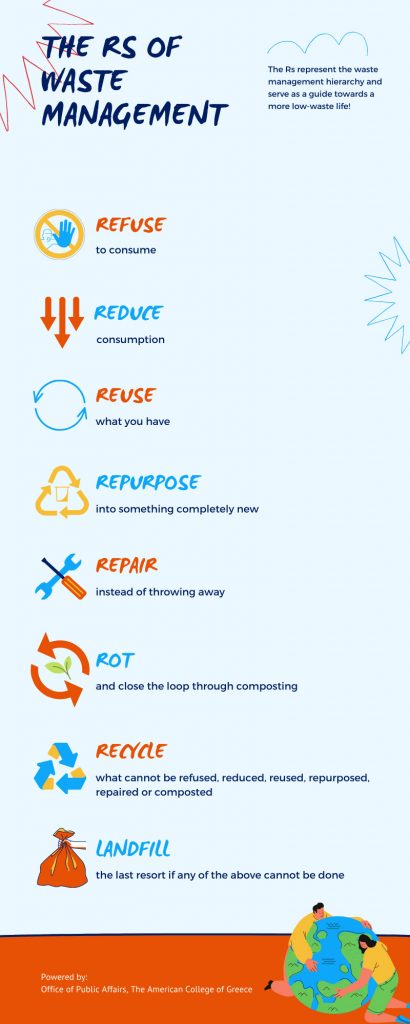
REFUSE
The easiest way to not produce any waste is to refuse consuming something in the first place!
Ask yourself “Do I really need it?” before buying something.
REDUCE
Reduce how much you consume. What can you easily reduce? Single-use items that are especially harmful, such as straws and plastic or paper bags. Reduce the number of items you bring to your home. Reduce the amount of food you waste.
REUSE
Reusing what you already have is one of the best ways to producing zero waste!
“How can I get into habit of reusing and repurposing”, you ask?
One of the most versatile items to reuse and/or repurpose are glass food jars! You can reuse them to store food. Another great tip is to make notepads out of scrap paper.
But what can you do when none of the above are possible? You can put the item up for donation and find it a new home! To facilitate this process, we have created the exclusive ACG Community Exchange Platform Reuse@ACG, where you can place items you no longer need for donation. Another fellow community member may be looking for them! Check below for instructions on how to log in.
Bonus tip: Looking for an item in particular? You can place a request through the platform and see if someone has the preloved item you are searching for! A win-win for all on the reduction-reuse front!
REPURPOSE
What if none of the above apply? Try repurposing the item and using it for something completely different. As we like to say, give it a new life!
Remember the glass food jars mentioned above? You can repurpose them into beverage glasses or vases! Do you have leftover food and are bored of eating the same thing? Don’t throw it away. Try repurposing it into a new meal!
REPAIR
In the last few decades, we have gotten into the habit of throwing away items that need fixing because replacing them with new ones has never been cheaper. But, oftentimes, a quick repair is all that is needed saving you money while protecting our planet’s resources! Try repairing any slightly worn out clothes or shoes or furniture. If you do not have the necessary tools, you can borrow them from a neighbor or even join a makerspace.
ROT
This is a big one as this closes the loop of all used materials, following the circular economy model! The only thing coming out of the loop would be compost. Check with your municipality if local composting bins are available or if you can participate in a local home-composting scheme. Another option would be to buy a kitchen compost bin, where you can store food scraps until you are ready to use them.
RECYCLE
Recycling is the last resort. The only thing potentially keeping an item out of the landfill. Unfortunately, not all items are recyclable. And many of them can be recycled only a finite number of times, such as plastic or paper. Plastic, for example, is almost always is downcycled (which means turning it into a lower quality product than the original one) and it can only be recycled once or twice.
Before placing something in the recycling bins, make sure to check if it is recyclable and follow the appropriate recycling guidelines/best practices at your country or area. When you are on campus, make sure to use one of the 34 recycling points that are available and check the recycling guidelines found below!
LANDFILL
When you are out of ‘Rs’, the only option is to discard something the old-fashioned way by throwing it in the garbage bin. The best advice we can give you it to try to avoid this as much as possible!
Reusing @ ACG
Aimed at educating our community on the importance of waste management and the waste hierarchy, ACG has launched its own community exchange platform Reuse@ACG, exclusively available to all ACG students, faculty and staff. Following US best practices, the Office of Public Affairs has introduced one more “sustainable custom” to our daily lives by launching a platform which aims at encouraging us to reduce and reuse the number of items that we buy and throw away. Through this platform, you can give a second life to items you no longer need by offering them to people that might need them, as well as get into the habit of checking out second-hand items before buying anything new!
We are proud to inform you that the Reuse@ACG exchange platform is the product of Deree students’ work! More specifically, the platform was designed and developed by Information Technology students of the Project Based Learning (PBL) workgroup, namely Marios Louvaris, Ioannis Reklos and Alexandros Ntourmisis, under the guidance and support of IT Professor Evgenia Vagianou.
Why Reuse?
It is easy, it is practical, it is clever and it feels good!
The best way to eliminate waste is to not create it in the first place. By reusing things, you lower the amount of materials dispatched to either landfills or recycling centers, while simultaneously decreasing the need for manufacturers to extract new materials from our planet!
By reusing you prevent pollution, save energy, reduce greenhouse gas emissions, save money, and reduce the amount of waste sent to landfills, recycling centers or incinerators.
Make it a habit to donate and/or find through the Reuse@ACG exchange platform a variety of items such as books, games, electronics, clothes, small furniture, gadgets, etc.
How to access Reuse@ACG
Make sure to check your ACGMail for the ACG memo sent to community members where you will find all the necessary information on how to log-in to the platform for the first time.
You will also receive a separate, personalized, email with your login details in the coming days.
Additional instructions on how to post in order to give away and/or request an item as well as on the general use of the platform can be found in the platform itself.
Recycling @ ACG
On campus, you can follow the guidelines below for appropriate recycling and waste disposal:
For Paper & Cardboard
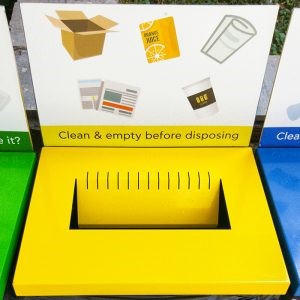
HOT Tips:
EMPTY > CLEAN > DRY > FOLDED
Recyclable Materials:
- Magazines and newspapers
- Old or destroyed books
- Leaflets and junk mail
- Paper catalogs and phone books
- Envelopes
- Computer/copy/fax paper
- Cardboard boxes
- Paper bags
How-To:
- NO dirty items and containers (e.g. pizza boxes)
- Paper smaller than A4 size cannot be recycled due to size
- NO paper tissues, napkins, kitchen and toilet paper
- Do not crinkle the paper before throwing into the bins
- Unfold cardboard boxes to minimize their volume before throwing into the bin
- Shredded paper (from the shredder) cannot be recycled on its own. Place in a small cardboard box
- Some on campus offices have an extra cardboard bin for recycling paper and cardboard boxes. Use the same instructions as for the Yellow Bin!
For Mixed Recyclables (plastic, aluminum, glass)
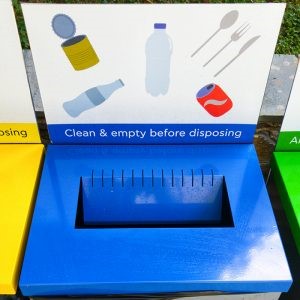
HOT Tips:
EMPTY > CLEAN > DRY
Recyclable materials:
- Plastic packaging such as water and beverage bottles, oil bottles, detergent and other cleaning products, yoghurt, butter, toothpaste, shampoo and shower gel bottles, plastic wrap, bags, etc.
- Glass packaging such as water and beverage bottles (milk, juices, and sodas), wines and other alcoholic beverages, food jars, etc.
- Tin and tinplate packaging such as beers and soda cans, oil, coffee, condensed milk, tuna, tomato paste, legumes and beans, animal food, etc.
How-To:
- Empty all containers from residual food or liquids and rinse them before placing them into the bin
- NO shattered glass in the blue bin
- Small pieces of packaging are non-recyclable due to size
- NO single use plastic utensils and drinking straws
- NO biodegradable and/or photodegradable plastic bags
- Always throw the materials in lose form and not in tied bags!
- Plastic caps (e.g. from water bottles) go to the separate cylindrical bin to be recycled for a good cause!
For Residual Waste (aka anything that is non-recyclable)
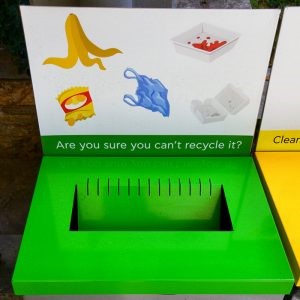
Materials:
- Paper tissues, napkins, kitchen & toilet paper
- Food waste/scraps (unless a composting/organic bacterial bin is available)
- Dirty containers and items
- Single-use plastics that cannot be recycled (straws, utensils, etc.)
- Candy wrappers and chips packaging
- Shattered glass
- All foam containers
- Office material such as plastic pens and small sticky-notes
Batteries, lamps, and ink cartridges.
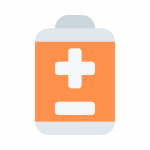
Batteries are collected separately for recycling, as they are highly toxic and increase the pollution potential of discards. Batteries recycling points are located at the DC building at 400 level, the CN building 3rd floor, and the PC building, outside the Principal’s Office.

Used fluorescent lamps and bulbs are collected separately in the respective recycling point located at the DC building Main Corridor (opposite the SSC) and at the PC building Patio.

First, recycle the plastic wrap the ink cartridges come in when opening and then check with the IRM Department if they are refillable/recyclable. Ink cartridges should never end of up in the landfill.
Our campus will become greener if you make waste reduction and recycling part of your life.
Reduce, Reuse, Recycle: Get Involved!


